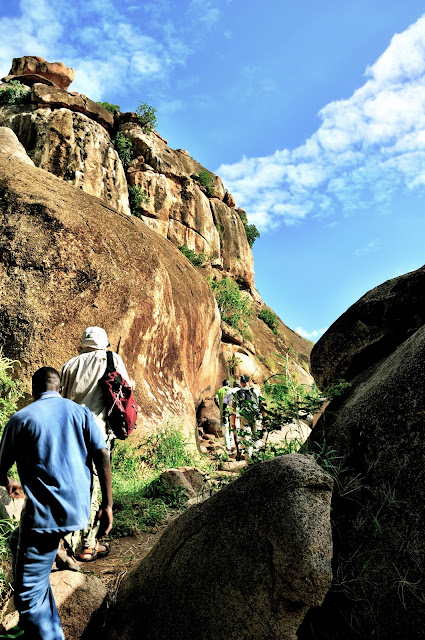Written By: Jonathan Pham
Today is the day where the rubber meets the road—we will be
starting our 20 mile journey to a northern Nuban village where a military
escort will pick us up and drive us to our final destination. We were told that
the trip would take 3 to 4 hours to complete---if only it were 3 to 4 hours!
When the initial trip from the refugee camp to our first checkpoint took twice
as long to accomplish, we knew that this next trip would be nowhere near a walk
in the park…
Got up at 0600, had breakfast, packed up, filled up our
water containers, and headed out by 0845—already making our first mistake of
the day: we should have left much earlier, perhaps 0730 to cover more distance
under the coolness of the morning.
The initial trek was not so bad. I even had
time to observe the local biodiversity. Along the roads, we ran into soldiers
and refugees, each with their own stories to tell. Then, things started to get
a little hairy---especially for me. 5 to 6 miles in I started to overheat…
I
used to think that God blessed me with such a rapid metabolism that would burn
food as rapidly as I consumed it-- key word being “burn”. The oatmeal with
protein powder, coupled with energy bars for breakfast provided me
enormous amounts of energy while causing me to dehydrate. I began to rapidly
drain my water reserves in an attempt to meet my metabolic demands and cool
off. Carrying a 70 lbs backpack didn’t help the situation at all. Sweat from my
body immediately evaporated as soon as it was produced. I couldn’t feel any
coolness that the sweat had to offer, just heat.
Mud from the roads would give
way, causing my boots to become heavy with clinging mud. Personal panic mode
activated around 4-5 hours into the trip, I succeeded in draining all of my
water reserves and there wasn’t a borehole in sight.
Worst case scenario
situations started to play through my head---how can I prevent this situation?
What can I do to retain water within my body? I allowed my mind to entertain
these thoughts for a moment until I was reminded of my Heavenly Father—what
purpose am I here for? Why am I experiencing this? My mind drifted towards the
Gospel. Could it be possible that what I am experiencing now may be used to
identify with the Nubans? Could God use this brief and light (I emphasize
light) affliction to allow me to
experience a taste of what they had to go through daily? Could this possibly be
a small glimpse of what Christ has done for our behalf? These people were
performing the burdensome task of carrying heavy goods such as wheat, rice,
iron pots, and even beds over the same distances and paths that we,
kuwahjahs (white people)
were struggling in, and they were doing so while malnourished with such grace
and strength. God has truly strengthened these people to live life as
necessary.

By the grace of God we managed to reach a borehole which we
aptly named “Jacob’s Well” which was situated within one of the mountains
there. We asked a soldier how far was our transit destination. He replied 4 km. We refilled our water reserves and then we decided to take
a break.

Despite God allowing us to exhaust all our energy reserves, He gifted
us with a spirit of understanding, humility and unity, allowing us to bear each
others burdens which involved foot blisters, water shortages, grime, and body
odor with minimal complaining if any. I learned much from my brothers during
this walk—Jacob revealed himself to be a father figure of the trip, always
looking for our member’s concern (especially mine). George was a man who was
acknowledged as neither full Nuban nor Kuwahjah, something that we jested about
for the remainder of the trip. John revealed to be very into kung-fu and
insisting that he was African to every single Nuban he encountered (I’m not
sure if they bought into it). David was the humble realist, always reminding us
to keep the eternal, Godly perspective at all times. And of course, there’s me, —the “stereotypical” push over who likes to throw a verbal/physical left
hook once in a while, just to keep things interesting.
The last trek from the borehole to our pickup destination
turned out to be the most difficult. We took about an hour break to regain our
energy and set off in the hot afternoon sun. Did I mention that it was hot? I
don’t think I could emphasize that quite enough. The sun was at an angle that
made shade formation difficult. I started to overheat again, drinking lots of
water. 4 kilometers? Really? At this point, the other guys were beginning to
overheat as well. Whereas initially in the first half of the journey, we took
about 3 half an hour breaks, we ended up taking 3-4 breaks within a few hours
of our second half. I think we started to get delirious and our thinking began
to become irrational. Despite all this, we never lashed out at each other,
and encouraged each other to persevere and carry on.
It wouldn’t be until around 1730 when our group reached the
check point. A 3 to 4 hour hike? Perhaps if you were Nuban. Looking back, God
did deliver us, and gave us the strength to accomplish what He desired of us,
removing any vestiges of self reliance so that when we arrived, we were
completely exhausted (quite the antithesis of the American charging in a huge
truck to save/change the world), with the added bonus of protecting us every
single step along the way.






















